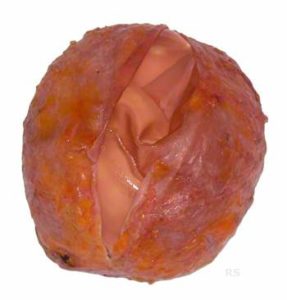
Image: You can see an old-generation breast implant with a smooth wall, which was inserted at the end of the 1980s for breast augmentation. The implant was removed due to third degree capsular fibrosis. A deformation of the breast was hardly visible, but a moderate hardening was palpable. The slightly thickened capsule was completely dissected out and then slit. The silicone implant, clearly folded by the shrinkage, can therefore be clearly seen.
Capsular fibrosis: symptoms
The classification of capsular fibrosis (also known as capsular contracture) according to Baker offers plastic surgeons a fairly good way of assessing the severity of fibrosis based on the development of the following symptoms.
- Grade I – stage without visible or palpable fibrosis.
- Grade II – In this Baker stage, minimal capsular fibrosis is barely detectable. Only a discrete hardening of the implants can be felt.
- Grade III – Mild contracture – Patients feel some tension or tightness.
- Grade IV – Immediately visible severe fibrosis of the capsule, sometimes with pain.
The symptoms with which patients go to their plastic surgeon are most often a visible deformation and, at an advanced stage, pain.
What is hidden behind capsular fibrosis?
Around every implant (not just breast implants), the body forms an endogenous shell called a capsule. This is normally very delicate and cannot be felt. This delicate tissue is fused with the surrounding area and secures the position of the implants, especially when they are placed under the muscle, provided that the breast implants are rough and the capsule can grow into them easily.
Rough implants are particularly advantageous for teardrop-shaped implants so that they cannot rotate as a result of waxing. This argument is not so important for round implants.
Fibrosis of the capsule after breast augmentation or after breast reconstruction with breast implants leads to a thickening of the capsule due to increased connective tissue formation. In extreme cases, it can become several millimeters thick.
What theories are known about the cause?
To date, it has not been possible to assign a clear cause to this fibrosis. The following factors are associated with the disease:
- Silicone leakage through the shell of the breast implants
- A genetic tendency to develop capsular fibrosis
- Foreign body reaction
- Autoimmune disorders of the connective tissue
- Bruising
- Infection or contamination (coming into contact) with bacteria without visible infection. (See source 2)
- Nature of the surface of the breast implants
There is evidence that breast implants implanted under the pectoral muscle have a lower rate of fibrosis in the breast. This may be due to the protection against bacteria, as the muscle is very well supplied with blood. However, there are also those who believe that it could be due to the movement of the breast implant through the muscle.
Treatment of capsular fibrosis in Düsseldorf
Treatment is often only necessary in stages III and IV of this fibrosis. On the one hand, there is the option of a capsulotomy, i.e. incision of the capsule in several places, if the capsular fibrosis is moderate.
On the other hand, there is capsulectomy, which involves removing the capsule. In this case, however, the part lying on the chest is usually left in place. If the breast implants lie over the pectoral muscle, they can be moved under the pectoral muscle, as the rate of breast fibrosis is lower here.
If capsular fibrosis keeps recurring, the only option is to remove the implants and then shape the breast by means of a breast lift at our clinic in Düsseldorf.
Another alternative treatment is the use of polyurethane-coated implants. There is practically no fibrosis with these implants. The disadvantage is greater tissue loss if the implants have to be removed at short notice for very rare reasons.
Sources.
- 1, Long-term safety and effectiveness of style 410 highly cohesive silicone breast implants. – Hedén P, Bronz G, Elberg JJ, Deraemaecker R, Murphy DK, Slicton A, Brenner RJ, Svarvar C, van Tetering J, van der Weij LP. – Aesthetic Plast Surg. 2009 May;33(3):430-6; discussion 437-8. Epub 2009 May 13 .
- 2, Pilot study of association of bacteria on breast implants with capsular contracture. – Del Pozo JL, Tran NV, Petty PM, Johnson CH, Walsh MF, Bite U, Clay RP, Mandrekar JN, Piper KE, Steckelberg JM, Patel R. – J Clin Microbiol. 2009 May;47(5):1333-7. Epub 2009 Mar 4.
- Plastic Surgery – Grabb & Smith – Lippinkott Williams & Wilkins – Philadelphia USA – 2007
- Plastic Surgery – Berger, Hierner – Springer – Volume 3: Mamma, Stamm – Berlin 2006

